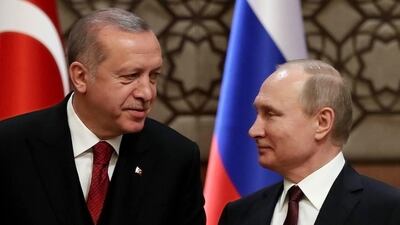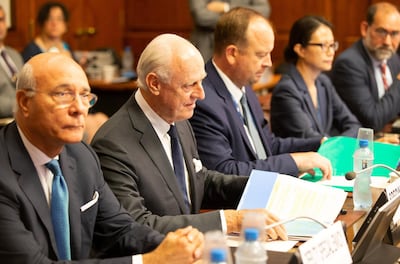Turkish President Recep Tayyip Erdogan will meet with his Russian counterpart Vladimir Putin on Monday in another bid to avert a looming Syrian government assault on the rebel-held province of Idlib bordering Turkey that has sparked international concern.
Turkey's Foreign Minister Mevlut Cavusoglu announced the meeting during a visit to Pakistan on Friday. "We will continue our efforts with Iran and with Russia. We will continue our efforts on international platforms as well," he said.
Kremlin spokesman Dmitry Peskov said the meeting would take place in the Russian resort city of Sochi. "Such a meeting is possible and is being prepared," he said.
Mr Peskov said Mr Putin discussed the situation in Idlib with members of Russia's Security Council on Friday.
However, Russian Foreign Minister Sergey Lavrov sought to dismiss fears of a major assault on Idlib.
"What is being presented at the moment as the beginning of a Russian-backed offensive by Syrian forces is not a faithful representation of the facts," said Mr Lavrov during a German-Russian forum in Berlin. "Syrian forces and we ourselves are simply reacting to the attacks coming from the zone of Idlib."
Russia-backed forces of the Syrian regime have massed around the Idlib province in recent weeks, sparking fears of an imminent air and ground attack to retake the last major opposition bastion.
UN agencies and relief organisations have warned repeatedly that such an assault could spark one of the worst humanitarian disasters of Syria's seven-year war.
The UN Special Envoy for Syria, Staffan de Mistura, called a meeting about the crisis with senior officials from Egypt, France, Germany, Jordan, Saudi Arabia, Britain and the US in Geneva on Friday.
An estimated 3 million people live in Idlib, nearly half of them having arrived there after being displaced by fighting elsewhere in Syria. Among the civilians are close to 1 million children, according to rights groups. A full-scale air and ground offensive is likely to send waves of refugees surging toward the sealed Turkey border, coinciding with the onset of winter.
Turkey has intensified negotiations with Russia to avert a possible attack, repeatedly calling for a ceasefire. Mr Erdogan and Mr Putin failed to agree on a ceasefire at a three-way summit in Tehran last week which also involved Iranian President Hassan Rouhani.
Russia and Iran are key allies of Syrian President Bashar Al Assad and are keen to see the last rebel-held province return to regime control. They say the province is home to terror groups. Turkey however backs opposition fighters seeking the ouster of the Syrian leader, and has said a large-scale offensive against the rebels could trigger a mass exodus towards its border.
The UN says nearly 40,000 people fled their homes over the past two weeks amid fears of a full-scale assault and after heavy Russian and regime bombardment at the weekend.
Mr Cavusoglu said Turkey was ready to co-operate with anyone in the fight against terror groups in Syria, but criticised the Damascus regime for using the presence of extremist groups to legitimise a possible operation in Idlib.
"We are ready to cooperate with everyone in the fight against terror groups but the killing of civilians, women and children under the guise of fighting against terror is not correct," he said.
"We cannot bring peace that way."
Idlib's most powerful armed faction is the Hayat Tahrir Al Sham (HTS), which Ankara officially designated a "terrorist" group last month. The group is dominated by the former Syrian affiliate of Al Qaeda.
Turkey's Defence Minister Hulusi Akar and Chief of Military Staff Yasar Guler on Friday visited the provinces of Hatay and Gaziantep bordering Syria where the country has reinforced troops in recent weeks.
Syrian activists meanwhile said new military reinforcements had arrived to beef up Turkish observation points inside Idlib. Turkey has set up 12 such posts around Idlib under a de-escalation agreement reached last year with Russia and Iran.
The state-run Anadolu Agency reported late Thursday that commando units as well as howitzers, tanks, armoured personnel carriers and heavy work machines were sent to the town of Reyhanli in Hatay province as reinforcements.
Also on Friday, the Turkish news agency reported that a meeting between German, Russian, French, and Turkish senior officials was underway in Istanbul to discuss the situation in Syria.
According to the report, Turkey was represented by Ibrahim Kalin, Mr Erdogan’s special adviser; Germany by its national security adviser John Hacker; France by Philipe Etienne, senior diplomatic counselor for French President Emmanuel Macron; and Russia by Yuri Ushakov, senior adviser to Mr Putin.
_______________
Read more:
Russia pre-empts Idlib offensive with smear campaign
If Idlib falls to the regime, Erdogan's whole borderlands strategy could be swept along with it
As the Syrian war nears its end, a tense new struggle is materialising
_______________


